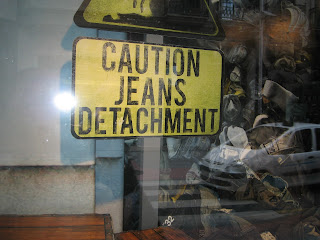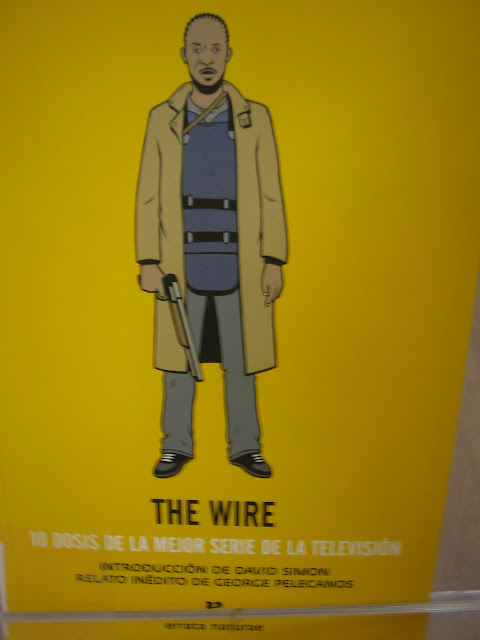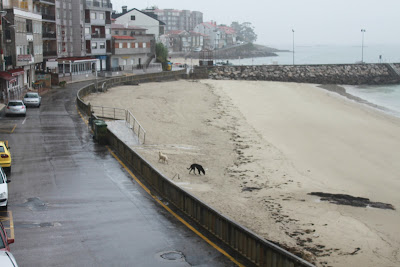Spain has a very long, rich, and utterly fascinating history, in ways both good and bad. From it's diverse ethnic history and separate states, to the establishment of a singular kingdom; it's history of exploration leading to a vast and powerful empire across the world; it's expulsion of ethnic and religious minorities during the Inquisition; to a modern civil war, bloody and protracted, leading to one of the lengthiest modern totalitarian states and generations of emigration. As is fitting with a country with such a dense and ambivalent past, Spain has a very complicated relationship with it's own history.
A few weeks ago I posted a picture from Combarro, which is a small town similar to Raxó and very nearby (about two towns over to our east). Combarro has been officially noted by the government as a town of unique historical value, both artistically and picturesquely, as it has remained in many ways very much untouched from what it looked like centuries ago. (Ironically, of course, this makes it a moderately popular tourist location, which has caused several small gift shops and new cafes to open, which in a sense has totally modernized it, but I digress--this article is about the legitimately antiquated aspects of it.) Combarro itself is a reminder of Spain's antiquity, and oft-reluctance to totally modernize; compared to the whole narrative of American history we learn in high school, the entire existence of the United States can seem, relative to Spain, like a brief moment of time.
I'm not sure exactly how old Combarro is, but I know at least one statistic that sheds some light as to its age: six of the old stone crucifixes which stand intermittently around the town (which are some of its main historic monuments) date back to 1727--these are not necessarily the oldest, just the ones that still stand and whose dates can be confirmed. What is notable about that is that the monuments were built already late into the town's history, during a time in which the Catholic Church wanted to instill its power on the area and reshape its long-standing pagan beliefs and rituals. (The crucifixes were built as a "protector" of the town, which had a firm belief that on cold and particularly dark nights malevolent spirits roamed the streets--something that is, of course, contrary to the beliefs of Catholicism. As a bit of a background here, Galegos, being Celtic, historically have/had a long mythology involving
brujas [witches], and believe[d] in the power of amulets and other charms.)
Combarro really is a beautiful town to this day, almost entirely constructed of stone and with several old
horreos (granaries), a large old shipping port, and tiny, winding roads way too small for cars, which lead to the old church in the center of town. Unfortunately I don't really have any good pictures to post yet (but I PROMISE that I will spend a proper day taking pictures there and post them), because the day that Emily and I spent there a tourist bus completely flooded the town, making the tiny streets impossible to even walk down (literally); taking a picture of anything without including 3 tourists in the frame was an impossibility, so we simply put the camera away. That Combarro has become so touristic is, to me, both a gift and a curse; it is rather unfortunate to see all the tourists and gift shops (although they are all, at least, kept within the old buildings), but at the same time it is a blessing to see that the town and its residents can remain there more or less on their own terms, protecting their legacy and figuring out how to profit from it, rather than adapting into something modern and without character.
Emily and I stopped to play cards and enjoy a glass of wine at an uncrowded bar with a nice garden, and started a conversation with the lady who owned it. Emily asked us when we might be able to return and avoid the tourists (she hates the giant tour buses, haha, which she dealt with on a daily basis in O Grove), and eventually the lady asked where we were from, which started a longer conversation. When I told her I wanted to be a filmmaker and was working on screenplays while living here, she told me about how (supposedly) Steven Spielberg had considered making a movie in Galicia, since some people (supposedly) believe Christopher Columbus may actually have been born here. When I told her I was also working on a documentary project about my family's immigration story, she became more interested; "Ah," she said, "you must have a strong desire to know your family's history, since you don't have much of a history of your own." I could tell she didn't mean that in any kind of a pejorative sense, but still I wasn't quite sure what she meant. It turns out she was speaking about my history as an American, which, in her view, was barely a blip in time. "My house is older than your country," she said, to which I laughed; "seriously," she insisted, "it probably is."
We spoke a bit about history, which she seemed at once very interested and invested in, and at the same time tired of and unwillingly chained to; "the history books here are so thick," she said, "
mi madre." Her insistence that the United States had "no history" was interesting to me; of course on one hand it's flatly incorrect, but at the same time her point retains validity because the vast majority of the history of our country has not only been whitewashed and revised, but pointedly destroyed and ignored. When I told her that the United States Constitution was heavily influenced by the Iroquois Confederacy, which predated the Constitution by probably hundreds of years, she was amazed and confessed she had had no idea; I wasn't surprised, since the vast majority of Americans don't either.
I've always wondered to what extent the United States' "newness" is a factor in what makes it such a unique nation--capable seemingly of anything, and yet with so little that is considered sacred or shared. That question is easily the most fascinating thing about the narrative of
Mad Men, whether it is explored consciously or not, as *****(very slight spoiler alert)***** Don Draper's double-life is very clearly a metaphor for the United States in that regard--a nation that, like Draper, is constantly morphing and changing, especially during the narrative's era of profound social change. If we can imagine a nation like a family (a metaphor several classic American films have explored, notably
The Birth of a Nation and
Gone With The Wind), there is another, deeper parallel between Spain's relationship with it's history and the United States' with it's own. In Spain people generally feel a major obligation to their family: retirement homes are almost non-existent, with often several generations living in the same small home (a habit formed in part as a byproduct of Spain's historic failure to provide social welfare to the elderly); children are often very late to move out of their parents' home (in part a product of the cost of housing and poor economy); families are averse to relocate, and children seldom go to college far away or move (once they do) more than a short drive from home; Sunday lunches very typically remain a large family affair, celebrating nothing but its own simplicity. (This kind of connection remains for Spaniards even after death, something that was explored in the Almodovar film
Volver; trying to think of it just now, I could think of no American equivalent, as movies from the United States that explore ghosts and their relationships with living loved ones tend to lean towards the melodramatic, such as
Ghost,
Ghost Dad, The 6th Sense,
Field of Dreams, Frequency et al.) Spaniards are tied to their families, both for better (often, as they assert their love for creature comforts), but also for worse, as such habits no doubt contribute to the perpetuation of other social and economic problems. Americans, on the other hand, seem to me to have a much smaller connection to their families in the long term; retirement homes/communities are the norm for grandparents, rather than living with their children; teens are encouraged to go out and room in a university; and major stigmas are attached to children who still live with their parents into their mid-to-late 20s. These things are often seen as more pragmatic and responsible decisions, and very well may be--I'm less interested in judging than I am identifying what seems to be unique about each country.
While I don't want to draw a simplistic conclusion, I suspect there is a connection here on some level, and I imagine it probably manifests in other ways I have not yet considered. In what ways are our habits and decision-making our own, and/or to what degree are they shaped by our environment and an entire history that has taken place even before our birth? Probably we'll never quite know.
As for the lady who owned the bar, I ran into her about two weeks later at a bus stop in Pontevedra. She didn't recognize me right away, but when I reminded her about my American wife her face lit up. "Oh right!" she exclaimed, "how's your documentary project coming along?" I smiled and told her I hadn't worked on it much yet, that I was busy with another project; "well give yourself time," she advised, "it's very important." She then proceeded to advise me on three or four different places I could visit to research my family tree, find old records about births/marriages, etc., and unearth a lot of history. We spoke for a bit and then said goodbye. By chance I've seen her on the bus two additional times since then, and we share smiles and say hello.






























